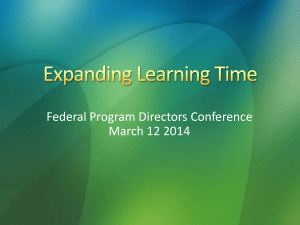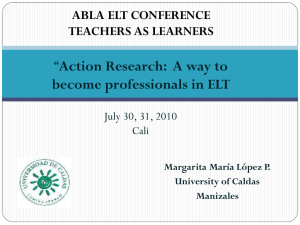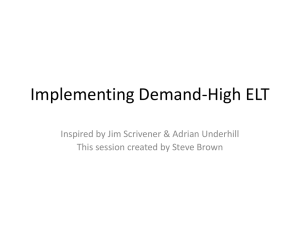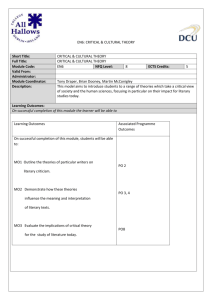2014 09Newsletter
advertisement
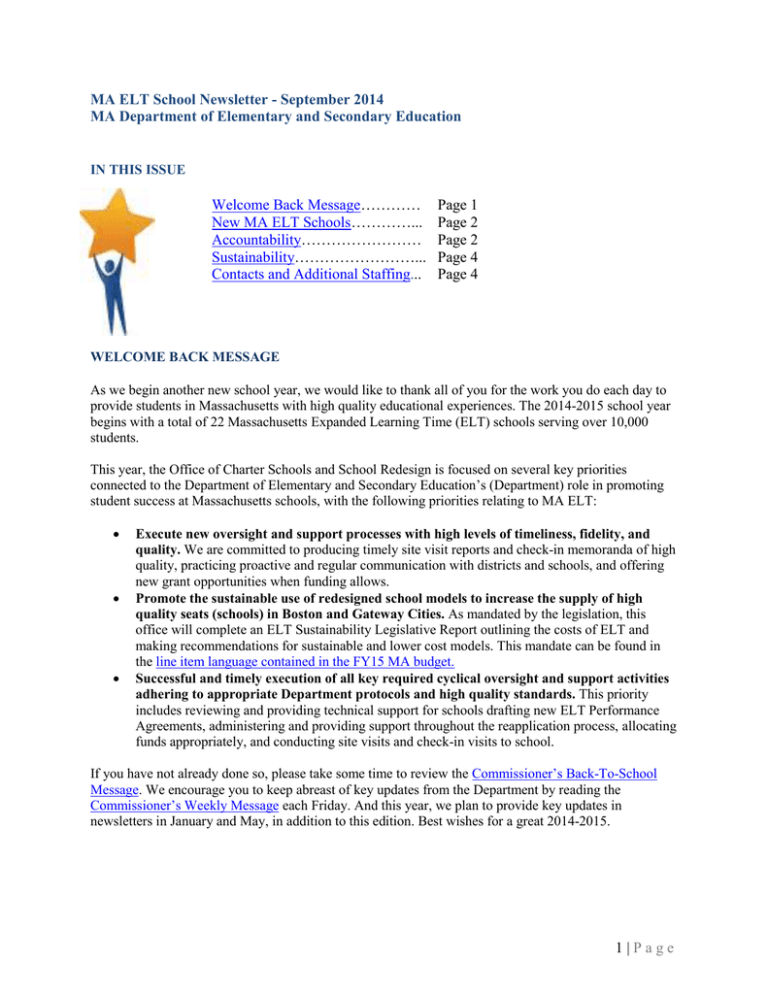
MA ELT School Newsletter - September 2014 MA Department of Elementary and Secondary Education IN THIS ISSUE Welcome Back Message………… New MA ELT Schools…………... Accountability…………………… Sustainability……………………... Contacts and Additional Staffing... Page 1 Page 2 Page 2 Page 4 Page 4 WELCOME BACK MESSAGE As we begin another new school year, we would like to thank all of you for the work you do each day to provide students in Massachusetts with high quality educational experiences. The 2014-2015 school year begins with a total of 22 Massachusetts Expanded Learning Time (ELT) schools serving over 10,000 students. This year, the Office of Charter Schools and School Redesign is focused on several key priorities connected to the Department of Elementary and Secondary Education’s (Department) role in promoting student success at Massachusetts schools, with the following priorities relating to MA ELT: Execute new oversight and support processes with high levels of timeliness, fidelity, and quality. We are committed to producing timely site visit reports and check-in memoranda of high quality, practicing proactive and regular communication with districts and schools, and offering new grant opportunities when funding allows. Promote the sustainable use of redesigned school models to increase the supply of high quality seats (schools) in Boston and Gateway Cities. As mandated by the legislation, this office will complete an ELT Sustainability Legislative Report outlining the costs of ELT and making recommendations for sustainable and lower cost models. This mandate can be found in the line item language contained in the FY15 MA budget. Successful and timely execution of all key required cyclical oversight and support activities adhering to appropriate Department protocols and high quality standards. This priority includes reviewing and providing technical support for schools drafting new ELT Performance Agreements, administering and providing support throughout the reapplication process, allocating funds appropriately, and conducting site visits and check-in visits to school. If you have not already done so, please take some time to review the Commissioner’s Back-To-School Message. We encourage you to keep abreast of key updates from the Department by reading the Commissioner’s Weekly Message each Friday. And this year, we plan to provide key updates in newsletters in January and May, in addition to this edition. Best wishes for a great 2014-2015. 1|Page NEW MA ELT SCHOOLS As mentioned, this school year begins with a total of twenty-two (22) schools in eleven (11) districts in the Massachusetts Expanded Learning Time initiative (ELT). The growth of this program from ten (10) in the first cohort of schools in 2006-2007 (6 of which remain in the program) to 22 in 2014 is indicative of the importance placed on time as a key lever to ensure positive student outcomes and the investment that the state is willing to make to support this strategy. As many of you may know, we conducted a competitive grant process in the spring and we are pleased to welcome four (4) new schools into the MA ELT initiative: Young Achievers (Boston), Paul A. Dever Elementary School (Boston), Guilmette Middle School (Lawrence), and Collins Middle School (Salem). Each school submitted a strong plan that strategically described how they will use time to serve the student needs unique to their schools. Additionally, each school requested funding that amounts to $800.00 or less per pupil. Their ability to plan around an allocation that is significantly less than $1,300 per pupil has allowed more schools to participate in this initiative and will likely help inform policy going forward. ACCOUNTABILITY ELT Site Visits We are preparing to conduct full ELT Site Visits to Cohort II schools, which include: Boston Arts Academy, Boston Silvia (North End) Elementary School, Fall River Greenfield Middle School, Greenfield Newton Elementary School, Greenfield Ferryway School, Malden City View Discovery School, Worcester Site visits are one of the means by which the Department documents each ELT school’s performance and progress over time, corroborating and augmenting the information reported each year in the school’s reapplication within the context of the ELT Performance Agreement. Equally important, the visits enhance the Department’s understanding of ELT program strengths and challenges, and provide an opportunity to offer feedback to schools as well as inform statewide technical assistance. Many of you have participated as peer reviewers on ELT site visit teams in the past, and your insights as practitioners have been invaluable. If you are interested in participating as a peer reviewer on an ELT Site Visit team in this or future years (PDP points are available), please contact Moira Connolly for more information. Check-In Visits Please note that we also plan to conduct check-in visits to all Cohort III schools, as well as to the new schools, and possibly to those that are of concern academically. These half-day check-in visits are designed to gather some observational and qualitative evidence regarding the schools’ implementation of expanded time and provide feedback, although on a more limited basis than for full site visits. We will contact individual schools and districts about the scheduling of these visits in the coming weeks. ELT Performance Agreements – Changes to Current Term - Cohort I All ELT schools receiving grant funding through Fund Code 225 will be drafting/redrafting ELT Performance Agreements either this year or in the coming years. All Cohort I schools and new schools 2|Page will be submitting new three year performance agreements this year. These agreements inform funding decisions and are one of the means by which the Department monitors each school’s implementation and outcomes. Due to the high demand across the state for limited ELT funds through line item 7061-9412, coupled with the ongoing emphasis on outcomes, expectations for schools currently receiving this funding are correspondingly high. As you know, ELT funds provided through state budget line item are intended to be used to effectively leverage time to improve student performance and it is not an entitlement, legacy, or turnaround grant. During the past few years, the Department has stopped awarding grant funding to three (3) schools, based on persistent concerns about the school’s ability to effectively leverage ELT funds to improve student performance. As we move forward we intend to offer clear signals to schools and districts, so that schools and districts can have time to respond to concerns and better plan for the future. While the performance agreements will continue for three years, they will be reviewed on an ongoing basis, and when necessary, the Department will require specific schools to meet prescribed annual benchmarks in order to retain grant funding. The following changes to the ELT Performance Agreements will be in effect this academic year for all Cohort I and for all redrafting cohorts going forward: If a school’s academic performance causes significant concern based on sustained performance below expectations or more precipitous short-term losses, we will inform the Commissioner, who may place a school on notice of academic conditions that must be met in successive years in order to retain funding under the grant, regardless of the point in the three-year cycle of the school’s performance agreement. New ELT Performance Agreements will continue to be valid for three years, but will be reviewed on an ongoing basis to ensure progress toward the goals outlined in these agreements. At the end of the third year of implementation of any ELT Performance Agreement, schools will continue to reapply for funding for another three years and a determination will be made regarding funding for the next three-year term. This determination will be made based on student performance data, qualitative evidence of high quality ELT implementation primarily gathered via site visits, and success in meeting ELT Performance Agreement measures. As in the past, continued funding during the performance agreement period is always subject to annual appropriations. Schools new to the initiative will draft and finalize performance agreements, setting three-year goals, as all other cohorts have done, and can expect to have the full first three-year cycle to meet their goals. Schools drafting new ELT Performance Agreements this fall are: Edwards Middle, Boston* Fletcher-Maynard Academy, Cambridge* Martin Luther King, Jr., Cambridge* Kuss Middle, Fall River* Salemwood School, Malden* Jacob Hiatt Magnet School, Worcester* Young Achievers, Boston** Paul A. Dever Elementary, Boston** Guilmette Middle, Lawrence** Collins Middle, Salem ** *Denotes Cohort I school **Denotes new MA ELT school 3|Page For those schools scheduled to draft new performance agreements, the Department will conduct a webinar on the performance agreement format and creating outcome measures on Tuesday, October 7, 2014 at 3:00 p.m. Please register at: http://www.doe.mass.edu/conference/?ConferenceID=5957 Please see the following schedule of performance agreement draft submission and revision due dates: 1. Tuesday, October 7, 2014 – Technical Assistance Webinar for all ELT schools 2. Friday, November 7, 2014 – First draft of Performance Agreement due 3. Friday, December 19, 2014 – Final signed Performance Agreement due and submitted to the Department. *Please note: Grant funding will be placed on hold in districts whose school’s performance agreements are outstanding after the final draft due date until a satisfactory final draft is submitted and signed. SUSTAINABILITY Since the inception of the MA ELT initiative in 2006, the Commonwealth has invested over $119,466,180.00 in grant funding for districts and schools expanding time. With 22 schools and many ELT veterans among them, the Legislature has asked the Department to take stock and report on models that provide good return on investment. In its request for a report, the Legislature casts an eye toward both affordability and assessing the cost of creating opportunity for additional schools and districts to offer more time for their students and educators (FY15 legislative language). In order to provide a robust response, the Department, in partnership with the National Center on Time & Learning, has reached out over the last four months to ELT stakeholders through focus groups and interviews. All participants have been generous, candid and invested in sharing successes, challenges and ideas to inform the future of ELT. We expect to complete these discussions this month with teacher focus groups and a short survey. Thanks to all who have participated in this important conversation. We will provide continuing news about this work in future newsletters. In the interim, please feel free to contact, Kathy Cross, our TIME Collaborative Coordinator with comments and questions. CONTACTS AND ADDITIONAL STAFFING The Department is in the process of interviewing for the position of Contract Expanded Learning Time Program Specialist within the Office of Charter Schools and School Redesign. This part-time staff member will assist in coordinating and conducting site visits and check-in visits, as well as authoring a number of the reports. Once a final candidate is chosen, we will forward the appropriate contact information to all of you. As always, we are happy to hear from you with any questions, concerns, or requests for clarification. For inquiries regarding MA ELT - Moira Connolly, Education Specialist for ELT 781-338-3216 mconnolly@doe.mass.edu For inquiries regarding the TIME Collaborative and sustainability issues - Kathy Cross, TIME Collaborative Specialist 781-338-3231 kcross@doe.mass.edu 4|Page
